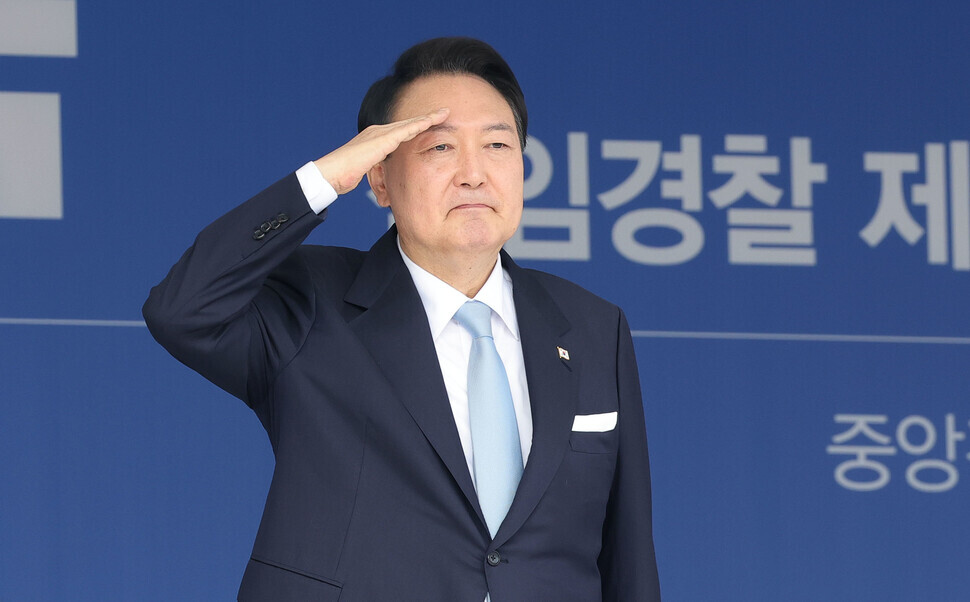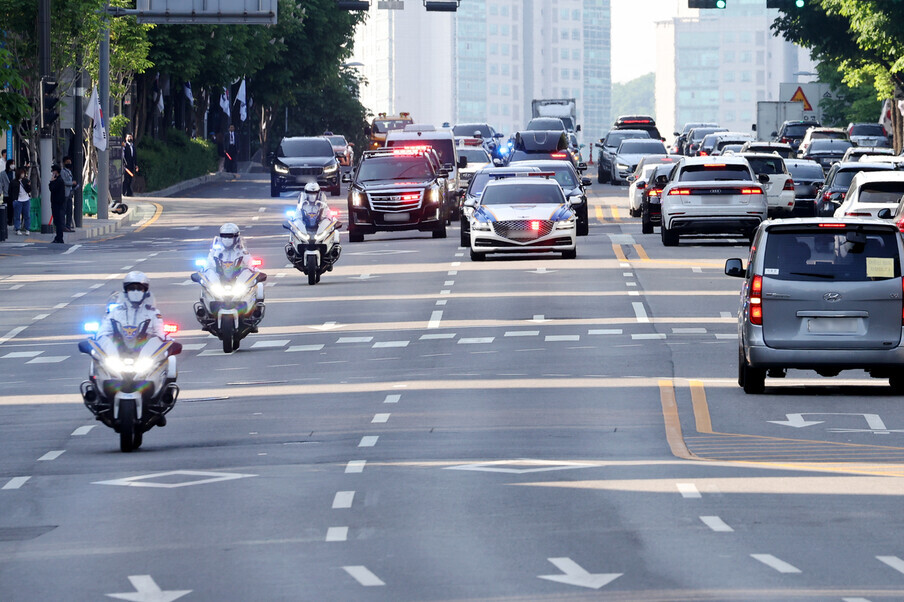hankyoreh
Links to other country sites 다른 나라 사이트 링크
Yoon’s commute requires 700 police per day for security, up 75% from Blue House era

Since South Korean President Yoon Suk-yeol is currently commuting from his home in Seoul’s Seocho District to the presidential office in Yongsan District every day, the police security detail has reportedly increased by around 75% from when presidents lived at the Blue House, government records show.
Documents that the National Police Agency provided to Lee Sung-man, a National Assembly member with the Democratic Party on the Public Administration and Security Committee, on Sunday show that the police have assigned eight companies and one squad of female riot police to the presidential office and Yoon’s residence for both the daytime and nighttime hours. Each company is composed of three squads, with each squad numbering around 30 people.
Since March 10, shortly after Yoon’s election as president, the area around Yoon’s home in the Acrovista apartment complex in Seocho has been put in the care of two companies of riot police and two teams of female police officers in the daytime and two companies at night. And since May 9, the eve of Yoon’s inauguration, the location of the presidential office in Yongsan has been patrolled by three companies and two teams of female police in the daytime and one company at night. There are six to seven people in one team and four teams in a squad.
In addition, the police have assigned around 30-40 traffic police officers from the Seocho and Yongsan police departments to direct traffic when the president is on his way to and from work.
The police have not disclosed the exact size of these detachments for security reasons, but security details typically include an average of 25 people. Given that, it’s presumed that 690-700 police officers are involved in providing security for the president each day (including 600 people in eight companies, 30 members of the female riot police, and 30-40 traffic police officers).

That’s about 75% more than the police detachment required for presidents living and working at the Blue House. Figures released by the National Police Agency show that the Blue House had three companies and one female police squad assigned during the daytime and two companies assigned at night. Applying the same metrics to security details would mean around 400 police officers on the job.
Now that the president’s residence and office are separated following the move to Yongsan, around 300 more police officers have been assigned to security.
“One reason is that staff have been assigned both to the presidential office and residence to prepare for surprise protests and people throwing items. Another is the large size of the Yongsan site,” explained a source with the police.
Since the announcement that the presidential office would be relocated, critics have objected that police resources would be squandered on providing security and directing traffic. While the president was living at the Blue House, the residence and workspace were enclosed behind the same walls, but now the two are separated. It was inevitable that more police officers would be needed to monitor the two sites and provide security and direct traffic as the president travels to work and back home each day.
In the first half of this year, the Yongsan Police Station added around 50 people to its original workforce of 700, mostly in the areas of traffic and intelligence. To achieve that, Yongsan dissolved its financial crimes investigation team on May 11, the day after Yoon’s inauguration, as part of a personnel reshuffle. That has led some to complain that criminal investigations into everyday issues are suffering because of the relocation of the presidential office.
By Kwak Jin-san, staff reporter; Kim Mi-na, staff reporter
Please direct questions or comments to [english@hani.co.kr]

Editorial・opinion
![[Column] Season 2 of special prosecutor probe may be coming to Korea soon [Column] Season 2 of special prosecutor probe may be coming to Korea soon](https://flexible.img.hani.co.kr/flexible/normal/500/300/imgdb/original/2024/0426/3317141030699447.jpg) [Column] Season 2 of special prosecutor probe may be coming to Korea soon
[Column] Season 2 of special prosecutor probe may be coming to Korea soon![[Column] Park Geun-hye déjà vu in Yoon Suk-yeol [Column] Park Geun-hye déjà vu in Yoon Suk-yeol](https://flexible.img.hani.co.kr/flexible/normal/500/300/imgdb/original/2024/0424/651713945113788.jpg) [Column] Park Geun-hye déjà vu in Yoon Suk-yeol
[Column] Park Geun-hye déjà vu in Yoon Suk-yeol- [Editorial] New weight of N. Korea’s nuclear threats makes dialogue all the more urgent
- [Guest essay] The real reason Korea’s new right wants to dub Rhee a founding father
- [Column] ‘Choson’: Is it time we start referring to N. Korea in its own terms?
- [Editorial] Japan’s rewriting of history with Korea has gone too far
- [Column] The president’s questionable capacity for dialogue
- [Column] Are chaebol firms just pizza pies for families to divvy up as they please?
- [Column] Has Korea, too, crossed the Rubicon on China?
- [Correspondent’s column] In Japan’s alliance with US, echoes of its past alliances with UK
Most viewed articles
- 1‘We must say no’: Seoul defense chief on Korean, USFK involvement in hypothetical Taiwan crisis
- 2Why Kim Jong-un is scrapping the term ‘Day of the Sun’ and toning down fanfare for predecessors
- 3Two factors that’ll decide if Korea’s economy keeps on its upward trend
- 4BTS says it wants to continue to “speak out against anti-Asian hate”
- 5After election rout, Yoon’s left with 3 choices for dealing with the opposition
- 6Gangnam murderer says he killed “because women have always ignored me”
- 7South Korea officially an aged society just 17 years after becoming aging society
- 8Noting shared ‘values,’ Korea hints at passport-free travel with Japan
- 9Ethnic Koreans in Japan's Utoro village wait for Seoul's help
- 10US citizens send letter demanding punishment of LKP members who deny Gwangju Massacre